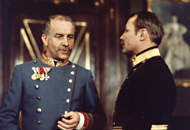Music and Musil
Clarisse and Walter seem to take an emblematic or symbolic role in the novel as representations of the artistic ideas at work in Vienna at the time. In a sense their love of music, or the act of sitting together at the piano, serves as the sole means for linking them as lovers. Metaphorically I believe that their shared love of music and the means by which they use it to communicate reflects the important and elevated place that the arts held in Vienna. Likewise the manner in which music serves as a forum for their arguments and spats reflects the highly discussed and contestable nature of the artistic community. Of particular note is their ongoing debate over Wagner. It is my belief that Clarisse's contempt for Wagner reflects Hanslick and Shoenberg's objection to Wagner's popularization of the "geswantkunstwerk" (sp.?). There is a sense in which Walter treats his love of Wagner as a guilty pleasure or indulgence of sorts. After considering the opera we viewed in class on Friday I feel as if I can understand why a character as "hifalutin" or "refined" as Clarisse would object to such work. As impressive as opera may be I can understand how some may have found the opera's of Wagner to be a dilution of pure musical craft and language. Her objection or concern over Wagner, as far as it has been insinuated, also seems to echo the concerns of Krauss and language. As a man who feels artistically impotent, it makes sense how Walter's embrace of Wager might represent an artistically inclined individual giving up on or abandoning the dream of artistic Viennese progress.



No comments:
Post a Comment